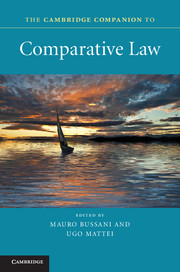Book contents
- Frontmatter
- Contents
- Contributors
- Abbreviations
- Preface
- Part I Knowing comparative law
- 1 Comparative law and neighbouring disciplines
- 2 Political ideology and comparative law
- 3 Economic analysis and comparative law
- 4 Comparative law and anthropology
- 5 Comparative law and language
- Part II Comparative law fields
- Part III Comparative law in the flux of civilizations
- Index
- References
5 - Comparative law and language
Published online by Cambridge University Press: 05 May 2013
- Frontmatter
- Contents
- Contributors
- Abbreviations
- Preface
- Part I Knowing comparative law
- 1 Comparative law and neighbouring disciplines
- 2 Political ideology and comparative law
- 3 Economic analysis and comparative law
- 4 Comparative law and anthropology
- 5 Comparative law and language
- Part II Comparative law fields
- Part III Comparative law in the flux of civilizations
- Index
- References
Summary
Introduction
In the work of comparative lawyers, language is essential to the process of acquiring knowledge of foreign law. Information on foreign law is in fact embedded in the language, which is expression of the culture, of the particular set of values, and – finally – of the mentality of lawyers, representing the legal system under analysis. Law and language are cultural phenomena that must be studied taking into account time and context.
That is why translation of legal information has always been considered one of the core questions of comparative law. At the same time reflection on legal translation has offered comparative lawyers the occasion to learn more about the multiple relationships between law and language.
On the one hand such reflection has developed a specific interest on the history and the development of legal languages, while on the other hand it has focused on the technicalities and the specific problems of legal translation.
More recently, comparative lawyers have focused their attention on more specific topics that highlight the various interconnections between law and language, like the policies of multilingualism in the European Union, the use of English as a legal lingua franca, and the related problems of translation.
- Type
- Chapter
- Information
- The Cambridge Companion to Comparative Law , pp. 88 - 114Publisher: Cambridge University PressPrint publication year: 2012
References
- 15
- Cited by

